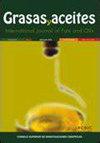Use of locust bean flour as a substitute for cocoa in the production of chocolate spread: Quality attributes and storage stability
IF 1
4区 农林科学
Q4 CHEMISTRY, APPLIED
引用次数: 0
Abstract
The effects of locust bean (carob) flour (LBF) as a substitute for cocoa in the production, quality attributes, and storage stability of chocolate spreads were investigated. CON (4.5% cocoa), CF15 (3.0% cocoa + 1.5% LBF), CF30 (1.5% cocoa + 3.0% LBF), and CF45 (4.5% LBF) formulations were produced, and stored at 22 and 35 °C for 12 weeks. Appearance, odor, sweetness, color, and overall acceptability scores decreased with increasing LBF, but up to 3.0% LBF did not affect the scores compared to the CON. Replacing cocoa with LBF at a low level resulted in higher hardness and spreadability. Hardness, free fatty acid, and peroxide values (PV) increased, aw values generally decreased during storage, but PV was still lower than 10 meq O2/kg. As the LBF ratio increased, darkening occurred in the chocolates. Thus, up to 3% of LBF can be used as a cocoa substitute with minimal quality and sensory changes in the production of chocolate spread.用槐豆粉替代可可生产巧克力酱:质量属性和储存稳定性
研究了槐豆(角豆树)粉(LBF)作为可可替代品对巧克力酱的生产、质量属性和储存稳定性的影响。生产了 CON(4.5% 可可)、CF15(3.0% 可可 + 1.5%枸杞豆粉)、CF30(1.5% 可可 + 3.0%枸杞豆粉)和 CF45(4.5%枸杞豆粉)配方,并在 22 和 35 °C 下贮存了 12 周。外观、气味、甜度、色泽和总体可接受性评分随着枸杞多糖的增加而降低,但与 CON 相比,高达 3.0% 的枸杞多糖不会影响评分。用低含量的枸杞多糖替代可可可提高硬度和涂抹性。可可的硬度、游离脂肪酸和过氧化值(PV)都有所上升,贮藏期间 aw 值普遍下降,但 PV 仍低于 10 meq O2/kg。随着 LBF 比率的增加,巧克力的颜色也会变深。因此,在巧克力酱的生产过程中,枸杞多糖可作为可可替代品使用,且质量和感官变化极小。
本文章由计算机程序翻译,如有差异,请以英文原文为准。
求助全文
约1分钟内获得全文
求助全文
来源期刊

Grasas y Aceites
工程技术-食品科技
CiteScore
2.50
自引率
0.00%
发文量
50
审稿时长
3 months
期刊介绍:
Grasas y Aceites is a peer-reviewed journal devoted to the publication of original articles concerning the broad field of lipids, especially edible fats and oils from different origins, including non acyl lipids from microbial origin relevant to the food industry. It publishes full research articles, research notes, reviews as well as information on references, patents, and books.
Grasas y Aceites publishes original articles on basic or practical research, as well as review articles on lipid related topics in food science and technology, biology, (bio)chemistry, medical science, nutrition, (bio)technology, processing and engineering. Topics at the interface of basic research and applications are encouraged. Manuscripts related to by-products from the oil industry and the handling and treatment of the wastewaters are also welcomed.
Topics of special interest to Grasas y Aceites are:
-Lipid analysis, including sensory analysis
-Oleochemistry, including lipase modified lipids
-Biochemistry and molecular biology of lipids, including genetically modified oil crops and micro-organisms
-Lipids in health and disease, including functional foods and clinical studies
-Technical aspects of oil extraction and refining
-Processing and storage of oleaginous fruit, especially olive pickling
-Agricultural practices in oil crops, when affecting oil yield or quality
 求助内容:
求助内容: 应助结果提醒方式:
应助结果提醒方式:


